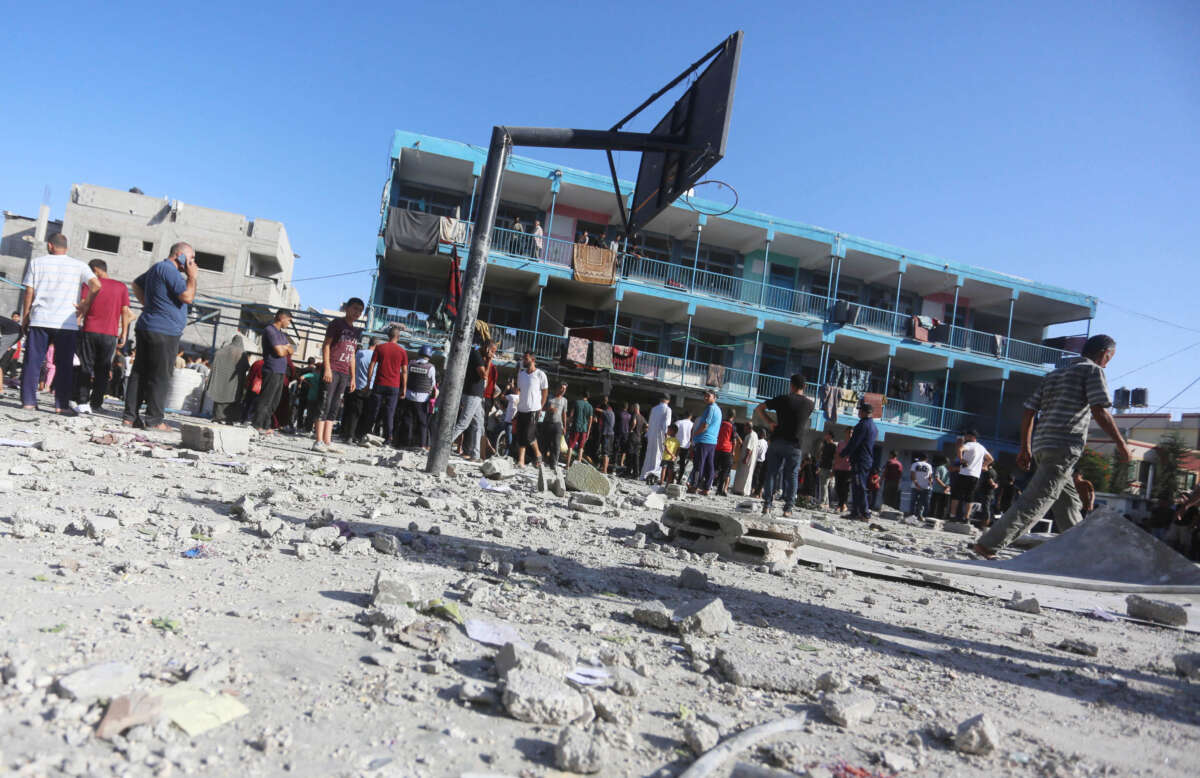Israeli forces struck the crowded area of Gaza that they designated a “safe zone” for the second time in two days on Wednesday, striking a school that was specifically marked as a humanitarian safe area in the Nuseirat refugee camp in central Gaza.
The strike on the UN-run al-Jaouni school killed at least 18 people and injured at least 18 more, according to initial reports by Palestinian officials. The school serves as a shelter for 12,000 Palestinians.
Six UN employees were killed in the strike, according to the UN Relief and Works Agency for Palestine Refugees (UNRWA), making it the single deadliest strike for the agency since the genocide began.
According to UN spokesperson Stéphane Dujarric, the school was deconflicted, meaning that the UN had arranged for it to be off-limits from Israeli attacks, potentially because it was being used for humanitarian operations or shelter for aid workers.
This means that, according to Israel’s own designations, the school had two layers of protection — being deconflicted and being in the safe zone — but was subject to an Israeli attack nonetheless, showing Israel’s continued disregard for even its own stated rules of engagement, much less the ones set up by international law.
The strike caused a “tremendous size of destruction” to the school-turned-evacuation center, Al Jazeera reports. Since the beginning of August, Israel has struck schools at least 17 times across Gaza. According to UNRWA, this is the fifth time al-Jaouni has been hit by Israeli forces.
The ever-shrinking “safe” zone encompasses only about 11 percent of Gaza’s land area, now housing at least 1.7 million Palestinians who have been forced out of their homes by Israel in the past 11 months. The area is extremely crowded, with very little room for movement and disease spreading quickly through the cramped quarters.
It was this dense area that Israel bombed early in the morning on Tuesday, killing at least 19 Palestinians taking shelter in a tent camp in the desert area of al-Mawasi. The attack, carried out using multiple 2,000 pound bombs fitted with U.S. equipment, wounded many, with many others likely buried in the sand or simply unable to be tallied because the blast tore their bodies to pieces.
The attack left gigantic craters in the ground, going as deep as 15 meters, or 49 feet, according to Al Jazeera.
Humanitarian groups said that the attack, likely a war crime, is a show that the “safe” zone in Gaza is anything but safe. Indeed, Israel has struck the “safe” zone at least a dozen times since it was first designated by Israeli forces in May.
The al-Jaouni school, meanwhile, is Israel’s latest attack on humanitarian workers. Israeli forces have killed 214 UN Relief and Works Agency for Palestine Refugees (UNRWA) workers since their genocide started, not including the workers potentially killed in Wednesday’s strike.
Angry, shocked, overwhelmed? Take action: Support independent media.
We’ve borne witness to a chaotic first few months in Trump’s presidency.
Over the last months, each executive order has delivered shock and bewilderment — a core part of a strategy to make the right-wing turn feel inevitable and overwhelming. But, as organizer Sandra Avalos implored us to remember in Truthout last November, “Together, we are more powerful than Trump.”
Indeed, the Trump administration is pushing through executive orders, but — as we’ve reported at Truthout — many are in legal limbo and face court challenges from unions and civil rights groups. Efforts to quash anti-racist teaching and DEI programs are stalled by education faculty, staff, and students refusing to comply. And communities across the country are coming together to raise the alarm on ICE raids, inform neighbors of their civil rights, and protect each other in moving shows of solidarity.
It will be a long fight ahead. And as nonprofit movement media, Truthout plans to be there documenting and uplifting resistance.
As we undertake this life-sustaining work, we appeal for your support. Please, if you find value in what we do, join our community of sustainers by making a monthly or one-time gift.
